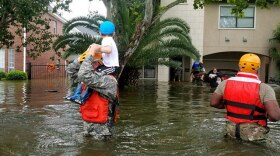One way teachers offset poverty in the classroom is by reaching into their wallets.
For some parents, filling a shopping cart with school supplies is a chore. For others, it's an impossibility. Many teachers would rather spend their own money, than see kids in their class go without.
School supplies as far as the eye can see
It's only September, so supply cabinets at W.S. Ryan Elementary in Denton are still pretty stocked. Willa Kemper is a bilingual teacher; she handles fifth grade math and science. To get through the year, her kids need everything from crayons to Clorox wipes, and a number of other items on the school supply list that went out to parents over the summer — a list the majority of parents couldn't afford to fulfill.
This year, Kemper has 40 kids between her two classes.
"And I only had 15 out of the two classes that were able to bring part of the stuff," she said.
Kemper's classroom doesn't look bare though. Shelves are lined with composition books. There's construction paper and markers-a-plenty. A table she calls the "share area" is glutted with glue sticks. Kemper, a 22-year-veteran teacher, bought 300 of them over the summer.
She shops, keeps her eyes open for sales and hoards school supplies all year long so her classroom will stay stocked. And she has a deal with her husband: a $500 supply budget over the summer and $100 each month once the kids come back.

That's $1,400 of her own money each school year. The average pay for a teacher of Kemper's of her experience level in Denton is about $60,000 a year, so that means she's spending nearly 2.5 percent of her salary on pencils, pens and pocket folders.
There is a reason.
"My parents had six kids, and I was the kid that didn't have anything to show up to school, and I know how that feels, and I don't want any kid to feel that way," she says.
Parents aren't always willing, or able, to help
The internet is filled with blog entries from parents bemoaning what they deem "outrageous" school supply lists. Kids are asked to arrive with dozens of No. 2 pencils, Ziploc bags, paper towels, even baby wipes. Teachers say a lot of parents can't afford to buy any of it. And the school district isn't making up the difference.
Charlotte May teaches third grade at Ryan Elementary. And she just realized dry-erase markers weren't on this year's supply list. That means purchasing them is up to her.
"I just put on my to-do list in my phone 'Go buy Expo markers for the class.' I have 18 students, you know? One of them who's going to leave their lid off of their marker is going to need another one," May says. "So I'm probably going to need at least five or six more, and that's just until they run out."

Teachers shelling out for classroom stock
May says she expects to spend about $1,000 before the final school bell rings in June. According to a survey from Agile Education Marketing, the typical teacher spends close to $500 a year for supplies. And while some parents gripe about what they're expected to buy before school starts, May says others buy extra — just to be nice.
"I can't think of any year that someone wasn't throwing in an extra glue stick here or there for somebody else," she says. "So as much as people complain about it, there's always the good people out there, too."
Willa Kemper has seen that, too, and she's also seen parents who are horribly embarrassed that they can't do more. And that's why setting aside a chunk of each paycheck to keep her students in spiral notebooks just makes sense to her. She says the kids in her bilingual class have enough to be worried about.
"They're struggling with trying to understand English and Spanish, and math, and science, and then add on to it, 'I don't have a pencil'? That's just too much to be on their shoulders," she says. "That's an adult issue in my opinion."
In Kemper's class, it's a teacher issue. And always will be.







